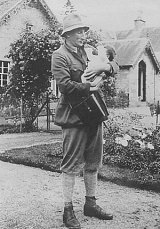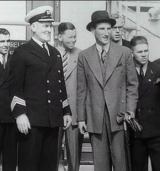The 2005 Ashes series may yet be decided by the fast bowlers on show for England and Australia. Neil Drysdale talks to the daughter of Douglas Jardine, the man who was the hero or villain, depending on your allegiances, of the most famous pace assault in Test history - Bodyline

|

Douglas Jardine and daughter Fianach
© Fianach Lawry
|
|
Douglas Jardine remains one of the most demonised figures in international sport, nearly 50 years after his death in 1958. As the architect of the Bodyline tactics which helped England's cricketers orchestrate a stunning triumph over the Australians in the latter's backyard during the series of 1932-33, he inspired fear and loathing not merely from the spectators at the various venues, but as far up the diplomatic chain as the Australian High Commission and Westminster. Even now, when one might have anticipated the emergence of a calmer perspective, Jardine is, for myriad observers, eternally associated with quintessential English imperialism and colonial arrogance.
What is most striking about these misconceptions is the fact that he was actually a Scot, whose daughter, the Reverend Fianach Lawry, maintains her father's qualities whilst serving as an Episcopalian minister at Muckhart, near Dollar, in Perthshire. As she points out, Jardine may have been born in Bombay on October 23, 1900, but his parents, Malcolm and Alison, considered themselves proud Scots to their bootstraps, and their young son was educated in St Andrews, regularly visited the Highlands, and when he died of cancer, his ashes were scattered over Cross Craigs mountains in Perthshire.
Jardine's children, Euan, Iona, Marion and Fianach, have subsequently devoted a great deal of their lives to the care of others - as a committed supporter of Nelson Mandela, Euan settled in Durban and was involved in the political upheaval which swept through South Africa until his premature death, also from cancer, in 1997 - whilst Marion trained as a social worker and eventually graduated to looking after children in London.
As for the Reverend Lawry, a graphic designer by trade, she has digested all the accounts of the Bodyline campaign, by which Jardine and his pace-bowling merchant of menace, Harold Larwood (a Nottinghamshire coal-miner) terrorised the Australian talisman, Donald Bradman, she has sat through an ABC-produced mini-series, which strove to paint her dad as some diabolic combination of Bertie Wooster and Dr Hyde, and she admits to being amazed and distressed that so much vitriol has been flung over his reputation when his only "offence" was, in actuality, a masterstroke which would nowadays have probably brought him a knighthood.
Whereas, in the 1930s, even some of the MCC committee members were happy to stick knives in Jardine's back once the dust had settled and both he and Larwood were peremptorily airbrushed out of the official chronicles, with one high-ranking executives going so far as to proclaim in a letter to a colleague: "Between you and me, Jardine is insufferable and worse than any German I encountered in the [First World] War. I cannot abide the man."
Nor indeed could the Australian Board of Control, who contacted Lord's with the hysterical cable: "Body-line bowling has assumed such proportions as to menace the best interests of the game, making protection of the body by the batsmen the main consideration. This is causing intensely bitter feelings between the players as well as injury. [Two were struck on the head]. In our opinion, it is unsportsmanlike, and unless it is stopped at once, is likely to upset the friendly relations which exist between Australia and England."
Perhaps, in the circumstances, it is hardly surprising that the Rev Lawry should respond with a vigorous denial of the wilder allegations and claim that her father was a painfully shy, reticent individual, who never really recovered from the stigma attached to his name as relations broke down between London and Canberra. "It is a total misrepresentation of the man who I knew and this idea that he would deliberately set out to hurt and injure players on the other side was anathema to him, and yet there is no doubt my father was badly affected by the criticism which was hurled in his direction," she told me, from her dwelling at Sunnybank Cottage in Dollar, where she was ordained as a priest in 1994, and has listened with genuine incredulity to Jardine's status being smeared by a litany of misconceptions, half-truths and once-young men embellishing their memories into anecdotage.
"He has been vilified for his tactics and for supposedly being arrogant and cocksure when the truth was that my dad was a nervous person, he bit his fingernails like mad, and yet, because he wasn't a great conversationalist, and was uneasy in what you might call the art of schmoozing at social functions, he wasn't able to respond to the barrage of personal abuse which wrecked his career and shattered his confidence.
"I think it is tremendously sad that his name has been linked, probably inextricably, with one of the most controversial campaigns in sporting history. Back in the Thirties, he was made the scapegoat, as was Harold Larwood, and I can honestly say he was never the same person again after that. It's ironic that nowadays, he would be regarded as a hero by his compatriots, but of course, my family has been affected by what befell him.

|

Douglas Jardine faces the media as the England side leave Tilbury bound for Australia in the autumn of 1933
© Cricinfo
|
|
"Basically, you have to understand this about my father: yes, he had high standards and was immensely competitive and refused to be content with coming second when there was a chance of victory. But he was never mean or petty, and although he harboured a huge regard for the ability of the run machine, Bradman, he knew that you will never win anything by sitting back and admiring your opponents. He simply acted in his side's best interests and the picture which has been painted of my dad is completely unknown to me and I have to confess I am amazed that the facts have been distorted for so long."
A few of the stains may have been eradicated by the efforts of Jardine's biographer, Christopher Douglas, whose account of the family's travails, following the patriarch's demise, reveals that although he might have worn a Harlequin cap on the field and been instrumental in a celebrated Ashes success, he was a Spartan fellow and that trait has been passed down to his offspring.
"We were shattered by dad's death and my mother [Isla] was especially in a state of abject grief. She destroyed many of his effects, including a lot of his cricket things, and the house was sold, but she found it hard to manage, not least financially," recalls Fianach. "Euan was taken out of school, and was set to work as a farm labourer. Iona became an air stewardess, and Marion devoted her time to social work. It was in 1985 that I started training for the ministry and that has been my calling ever since and I would argue that we learned many good qualities from my father.
"Somebody at his memorial service [Sir Hubert Ashton] said: 'People of his nature may go to remarkable extremes to try and disguise the fact that they are in the process of doing a kindly act. I do not suppose that he and I exchanged more than half-a-dozen letters in the course of our lives, but it is significant that the last of these was written shortly before he went into hospital and was to enquire whether I could help a mutual friend who was experiencing a difficult time. Ultimately, he was constantly thoughtful of others and when he was the president of the Oxford University Cricket Club, he gave unstintingly of his time, his experience, and his purse.' I believe that summed him up very well - he was a courageous man, a proud leader, and history confirms that in every sphere of life, such people will occasionally offend others."
With another Ashes joust in full swing, the Rev Lawry will, as usual, sit herself down, survey the proceedings, and doubtless reflect on the sea change which has occurred in the game since the Bodyline rumpus aroused heated debate in the House of Parliament and provoked mass brawls in Australian taverns between victorious supporters from Blighty and their vanquished rivals. But although she has a sneaking feeling that England may yet prevail on home soil, for the first time since David Gower showed the way in 1985, she is more concerned with loftier ideals.
"If you grew up as I did, then it would be difficult not to be seduced by cricket, and I have never forgotten the influence which my father had on me and everybody who came into contact with him feels the same," concludes the Rev Lawry. "For too long, he has been traduced as this win-at-all-costs Englishman, but that is simply nonsensical. He was ferociously proud of his Scottish heritage and we have all done our best to carry on that tradition. All that I am really asking for is a fair assessment of the man I loved."
Jardine surely merits such treatment at this stage. If only on the basis that, in the prelude to an Ashes contest on the field, his own remains are allowed to rest in peace.
Neil Drysdale's new book - Dad's Army - How Freuchie Took Cricket By Storm - is out now

